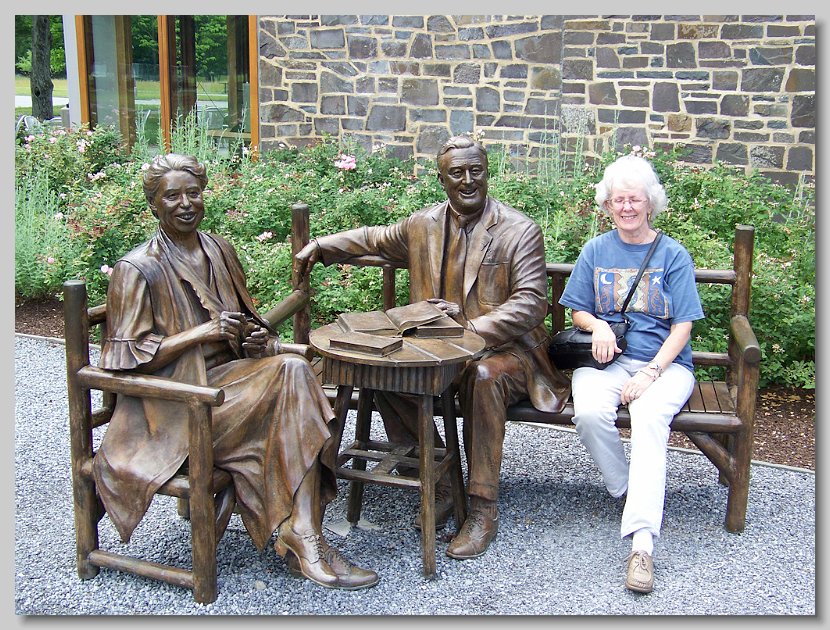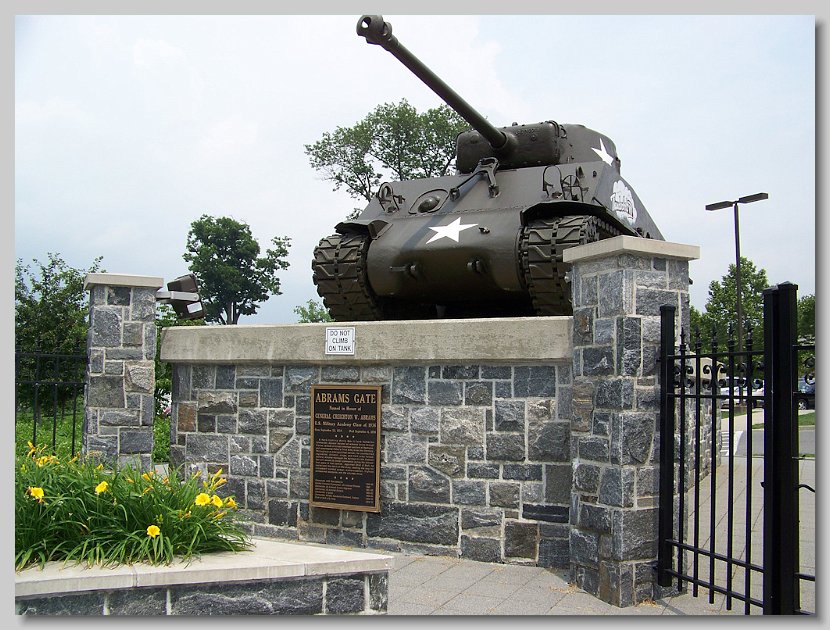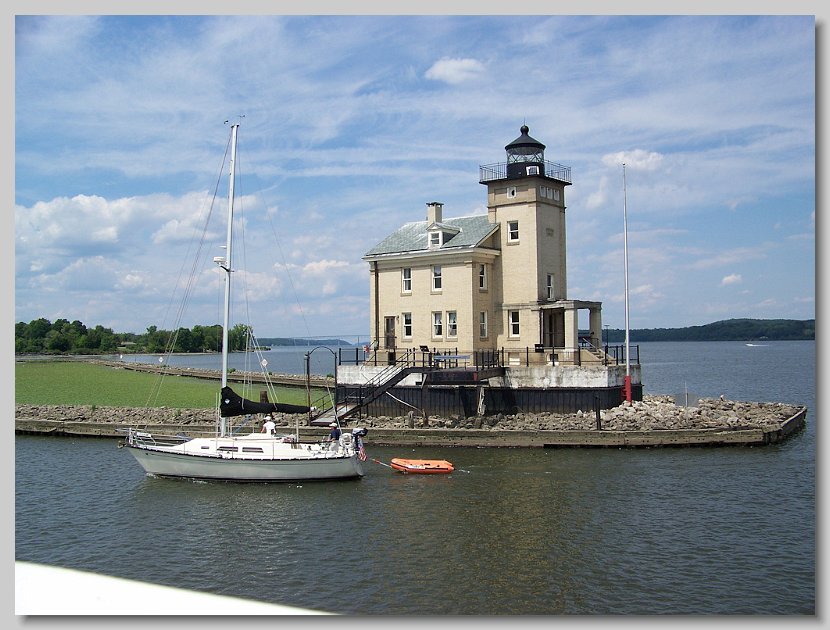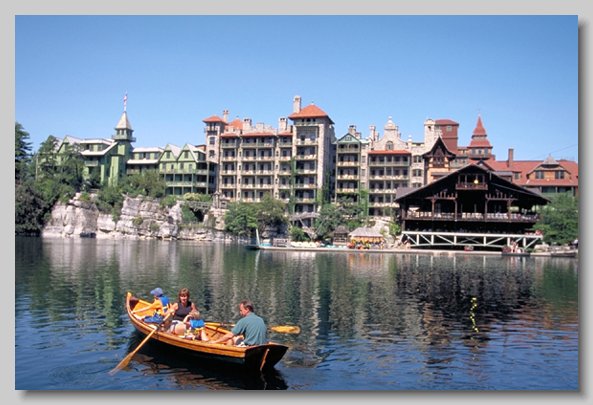
Jun 17-30 - Catskill Mountains Area
Our stay in the Catskill Mountains was interesting, but in reality it was more of a visit to the Hudson River Valley. We parked at a place named the "Catskill Adventure Resort", an aging mobile home resort, where most RVs are trailers or more permanent structures that never move. The park is under newish owners who are working hard to restore the place to some of its former glory. Just outside the town of Wurtsboro, the resort is just a hair west of the Hudson River Valley, and just a hair east of the actual Catskill Mountains. According to the road signs, it just 70 miles to New York City. We didn't go there, but we had a pretty good time where we did go.
Rose Burch asked if we knew how the Catskills got their name. We didn't, so we looked it up. Literally, from the old Dutch, it means "cat creek". But the "cat" part is open to much speculation - could have been because of the local populations of bobcats and mountain lions. Might have been named after a Dutch poet (Jakob Cats), or because of the Indian and French forts in the area (kats). According to Wikipedia, the bobcat theory gets the most acceptance. However, the name "Catskills" didn't come into much use until Washington Irving's writings became popular in the 1850s, the area previously having been popularly referred to as the "Blue Mountains".
 Hyde Park NY is best known as the home of Franklin Delano Roosevelt, and his Presidential Library and Museum are located on the family estate. We toured both the museum and the FDR home. Really a nice facility. It's only been in the last few years that FDR's paralysis has been "officially" acknowledged, and there are now many details of how he coped. Hyde Park is also the home base of the CIA - no, the other one - Culinary Institute of America - where they teach folks to be chefs. It's a huge place - must be a lot of people expecting the rest of us to eat out a lot. Hyde Park NY is best known as the home of Franklin Delano Roosevelt, and his Presidential Library and Museum are located on the family estate. We toured both the museum and the FDR home. Really a nice facility. It's only been in the last few years that FDR's paralysis has been "officially" acknowledged, and there are now many details of how he coped. Hyde Park is also the home base of the CIA - no, the other one - Culinary Institute of America - where they teach folks to be chefs. It's a huge place - must be a lot of people expecting the rest of us to eat out a lot.
 A few miles south of Hyde Park, and across the river, is West Point, the US Military Academy. It's an interesting place - much like any other big private college would be with a security fence all around and a couple hundred years of well-known graduates. There's a lot of tradition at West Point, and a lot of patriotism, as might be expected. West Point was a critical fortification during the Revolutionary War, as it controlled all traffic on the Hudson River, then (as now) a major waterway. The fort did keep the British from using the river to connect New York City and Canada, even though it was commanded at the time by Benedict Arnold. Arnold's plan to turn the fort over to the British was discovered before he could do it, and he immediately defected. We toured the place, including a stop at the main chapel, where we had a fascinating conversation with the gentleman who was working on the organ. The organ had been struck by lightning a couple of weeks before, and he was testing to see what worked and what didn't - no small task for an organ with over 23,000 pipes. He said so far it looked like about a third didn't work. Gonna be some repair job. A few miles south of Hyde Park, and across the river, is West Point, the US Military Academy. It's an interesting place - much like any other big private college would be with a security fence all around and a couple hundred years of well-known graduates. There's a lot of tradition at West Point, and a lot of patriotism, as might be expected. West Point was a critical fortification during the Revolutionary War, as it controlled all traffic on the Hudson River, then (as now) a major waterway. The fort did keep the British from using the river to connect New York City and Canada, even though it was commanded at the time by Benedict Arnold. Arnold's plan to turn the fort over to the British was discovered before he could do it, and he immediately defected. We toured the place, including a stop at the main chapel, where we had a fascinating conversation with the gentleman who was working on the organ. The organ had been struck by lightning a couple of weeks before, and he was testing to see what worked and what didn't - no small task for an organ with over 23,000 pipes. He said so far it looked like about a third didn't work. Gonna be some repair job.
 We drove a few miles north to the charming town of Kingston, where we took a two-hour river cruise aboard the Rip Van Winkle. We saw two of the river lighthouses and the water view of some spectacular homes and mansions. Somehow, we never really thought about seeing lighthouses on a river, but the Hudson has several. We'll be back in Kingston for one night after the 4th of July - we need to have the basin faucet in the bathroom replaced, and there's an RV service facility there that looks pretty good. We'll spend the night in their parking lot, and then head north toward the Lake George area after the work is done. We drove a few miles north to the charming town of Kingston, where we took a two-hour river cruise aboard the Rip Van Winkle. We saw two of the river lighthouses and the water view of some spectacular homes and mansions. Somehow, we never really thought about seeing lighthouses on a river, but the Hudson has several. We'll be back in Kingston for one night after the 4th of July - we need to have the basin faucet in the bathroom replaced, and there's an RV service facility there that looks pretty good. We'll spend the night in their parking lot, and then head north toward the Lake George area after the work is done.
The Catskill Mountains host a treasure trove of show business history. A hundred years ago, the resorts of the area were known as the Borscht Belt, and anybody who hoped to succeed in vaudeville had to pay their dues here. There's not much of that left now, of course, but some of the tradition lingers. We saw an enjoyable production of the light-weight musical "Forever Plaid" at a playhouse near Forestburgh NY. And we took a little side trip to the site of the Woodstock Music Festival, which actually happened near the town of Bethel. Today, the Woodstock site is home to Bethel Woods, an upscale performing arts venue. The New York Philharmonic was in residence while we were there, but at $90 a ticket, we passed. There were about half a million people at the Woodstock festival back in 1969. Today, the outdoor performance venue on that site can handle about 30,000 people. Bet they have better restrooms, too.
 One place we wanted to visit but didn't is the Mohonk Mountain House, a very upscale resort complex near New Paltz, NY. Room rates range from $350 to $1200 per night. Lunch starts at $35. Just to park at the gate and walk the two miles to the main hotel costs $17 a head. We settled for a handfull of brochures and this picture lifted from the internet. One place we wanted to visit but didn't is the Mohonk Mountain House, a very upscale resort complex near New Paltz, NY. Room rates range from $350 to $1200 per night. Lunch starts at $35. Just to park at the gate and walk the two miles to the main hotel costs $17 a head. We settled for a handfull of brochures and this picture lifted from the internet.
There are almost 100 pictures in our slide show for these three weeks. You'll find them here.
|

 One place we wanted to visit but didn't is the Mohonk Mountain House, a very upscale resort complex near New Paltz, NY. Room rates range from $350 to $1200 per night. Lunch starts at $35. Just to park at the gate and walk the two miles to the main hotel costs $17 a head. We settled for a handfull of brochures and this picture lifted from the internet.
One place we wanted to visit but didn't is the Mohonk Mountain House, a very upscale resort complex near New Paltz, NY. Room rates range from $350 to $1200 per night. Lunch starts at $35. Just to park at the gate and walk the two miles to the main hotel costs $17 a head. We settled for a handfull of brochures and this picture lifted from the internet.